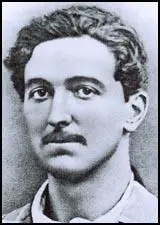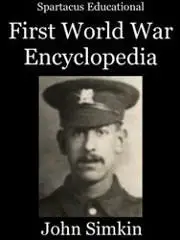C. B. Fry

Charles Burgess Fry was born in Croydon on 25th April 1872. He was educated at Repton School where he developed a reputation as an outstanding sportsman. He took his degree at Wadham College, Oxford, and represented the university at football, cricket and athletics.
He started playing cricket for Surrey in 1891. He continued to play other sports and in 1893 Fry equalled the then world long jump record of 23 feet 6 1/2 inches (7.17 metres).
Fry suffered a mental breakdown in his final year at Oxford University and although academically gifted he only managed to obtain a poor degree. After graduating from university, Fry taught at Charterhouse.
In 1894 Fry joined Sussex. He also played football for the amateur club Corinthians and rugby for Blackheath and the Barbarians. Cricket was his main sport and February 1896, he made his debut for England.
In 1898 Fry joined Southampton in the Southern League. A full-back, C. B. Fry won his first and only international cap for England against Ireland on 9th March, 1901. Also in the team that day was George Hedley, Ernest Needham and John Robinson. England won the game 3-1.
The following year Fry was in the Southampton team that reached the 1902 FA Cup Final. Sheffield United took an early lead but Southampton scored a controversial equalizer and the game was drawn 1-1. Fry wrote in the Southern Echo: "The outstanding feature of the match was the grand goalkeeping of Foulke. he made a number of good saves, and on two or three occasions cleared the ball from what appeared impossible positions. Once, near the end, from a corner, he effected an absolute miracle with four or five men right on to him."
William Foulke was furious that the equalizing goal had been given after the game he went searching for the referee. The linesman, J. T. Howcroft, described how Frederick Wall, secretary of the Football Association, tried to placate the goalkeeper: "Foulke was exasperated by the goal and claimed it was in his birthday suit outside the dressing room, and I saw F. J. Wall, secretary of the FA, pleading with him to rejoin his colleagues. But Bill was out for blood, and I shouted to Mr. Kirkham to lock his cubicle door. He didn't need telling twice. But what a sight! The thing I'll never forget is Foulke, so tremendous in size, striding along the corridor, without a stitch of clothing."
Walter Bennett was injured and could not take part in the replay. He was replaced by William Barnes on the wing. The game was only two minutes old when a massive clearing kick by Foulke reached George Hedley and Sheffield United took an early lead. Led by the outstanding Ernest Needham, Sheffield dominated play but Albert Brown managed to score a equalizer. Southampton began to apply pressure but according to the Athletic News, "Foulke was invincible". With ten minutes to go, Needham took a shot that the Southampton goalkeeper, John Robinson, could only block, and Barnes was able to hit the ball into the unguarded net. Sheffield won 2-1 and Fry was on the losing side.
The following season Fry failed to obtain a regular place in the Southampton defence. He also played twice at centre-forward, without success, and in 1903 he joined Portsmouth. After suffering a leg injury he retired from the game.
Fry now concentrated on his cricket career. A right-handed batsman, Fry became captain of Sussex in 1894 and headed the county batting averages in 1901, 1903, 1907, 1911 and 1912. Fry also captained England in six Test matches in 1912.
Fry took a keen interest in politics and was a strong supporter of William Gladstone. As a member of the Liberal Party he made several attempts to be elected to the House of Commons. The nearest he came to victory was when he lost by 224 votes in Oxford. In 1920 Fry became an adviser to the Indian delegation at the League of Nations in Geneva.
Fry, who also played for Hampshire, played first-class cricket until 1921. In a career that lasted 29 years, he scored over 30,000 first-class runs at an average of over 50. This included 94 first-class centuries.
After leaving the staff of Charterhouse, Fry became Director of the Training Ship Mercury, a nautical school primarily designed to prepare boys for service in the Royal Navy. He was eventually given the rank of captain in the Royal Naval Reserve (RNR).
In later life Fry suffered another major breakdown and showed signs of paranoia. In 1934 Fry met Adolf Hitler and invited members of Hitler Youth to visit the Mercury training ship. He expressed support for the Nazi Party until shortly before the outbreak of the Second World War.
Charles Burgess Fry died in Hampstead on 7th September, 1956.
Primary Sources
(1) C. B. Fry, Southern Echo (21st April, 1902)
The outstanding feature of the match was the grand goalkeeping of Foulke. he made a number of good saves, and on two or three occasions cleared the ball from what appeared impossible positions. Once, near the end, from a corner, he effected an absolute miracle with four or five men right on to him.
(2) J. A. H. Catton, The Story of Association Football (1926)
I have been scribbling about footballers from the days when I had some hair until now a comb is an encumbrance and scanty locks are silvered o'er with the toll of years. Seldom have players complained to me about what I have thought fit to set down.
Two instances to the contrary come to mind. When Sheffield United and Southampton met in the Final Tie for The Cup at the Crystal Palace in 1902 there was a curious incident, for when the second half was advanced and the United were leading by a goal scored by Common, Edgar Chadwick broke away and made a pass to Harry Wood, the father of Arthur Wood, who kept goal for Clapton Orient. The famous old Wolverhampton forward went on and scored. Thus the match was drawn-most unexpectedly.
At that time I had left the Press Box and was sitting on the pavilion near Mr. G.S. Sherrington, one of the vice-presidents of the Football Association, and Mr. P.A. Timbs, who was then on the Council. They turned and said that the goal was offside, but Tom Kirkham, of Burslem, the referee, gave a goal. I said that the ball grazed the knickers of Peter Boyle, the Sheffield United back, in transit. Strangely enough, John T. Howcroft, who was the linesman on the opposite side of the field to the grandstand, thought so, too.
The following Saturday the Final was replayed at the Crystal Palace, and I went down to the dressing cubicles in the pavilion to ascertain the teams before they went out. Peter Boyle saw me and most indignantly denied that the ball ever touched him, and threatened to do all manner of things with my poor body. No doubt he was annoyed and at the moment heated.
I felt the truth of what Lafcadio Hearn once said: "What is wanted in a time of embarrassment and danger is a good head not a strong arm." So I temporised about optical delusions and mistakes to which all men are subject.
Then there appeared in front of me a naked giant-one William Foulke, the Sheffield goalkeeper, who stood all six feet two inches and pulled down the scale at twenty stones. If ever man deserved the name of The Mountain he did. Foulke was good tempered and sought to quell the storm by humour. So he put himself in fighting position and said: "Come on, lad. You're just about my weight"-and I was a miserable five feet and under eleven stones. I could have laughed, but Boyle's brow was menacing.
The situation was far from pleasant, but Ernest Needham opened the door of his cubicle and pulled me inside. "Nudger" Needham surprised me by saying that I had left the Press Box and never saw the goal. I explained, and my peril passed. There is no doubt that I was mistaken-but two of the officials were the same.
(3) Graham Phythian, Colossus: The True Story of William Foulke (2005)
As the teams made their way from the pitch, a Southampton fan decided to vent his frustration on Needham, hitting the Sheffielder in the face. Perhaps he chose Needham because of the half-back's small stature. If it were so, it were a grievous fault. Nobody present - with the single obvious exception - could have been a more redoubtable opponent in such a confrontation than hard-as-nails Needham. Normally the soul of diplomacy, the United captain retaliated with a left-right combination that wouldn't have disgraced Bob Fitzsimmons. At this point the spectator, concluding it might be a good idea to make himself scarce, turned and ran - into the arms of a couple of policemen. The next day back in Sheffield there was a rumour that it was Foulke who had hit back. But as the Monday's Sheffield Telegraph wryly connnented: "The assailant may be glad it was only Needham."
Foulke's anger at Wood's last-minute goal was still smouldering as the teams reached the dressing rooms. Were the moneyed southerners about to steal a march as they had done the previous year? In broad terms, the South equalled London and the establishment. Jack Robinson, the Southampton goalie, was the usual choice for international honours, getting the nod over Foulke every time. And there was right-back C.B. Fry, landed gent and lauded amateur, the Corinthian whose well-bred insults directed at the professionals and the proles in football were well known. All these ingredients no doubt added to the cocktail of resentment simmering away inside the big man.
Student Activities
Walter Tull: Britain's First Black Officer (Answer Commentary)

